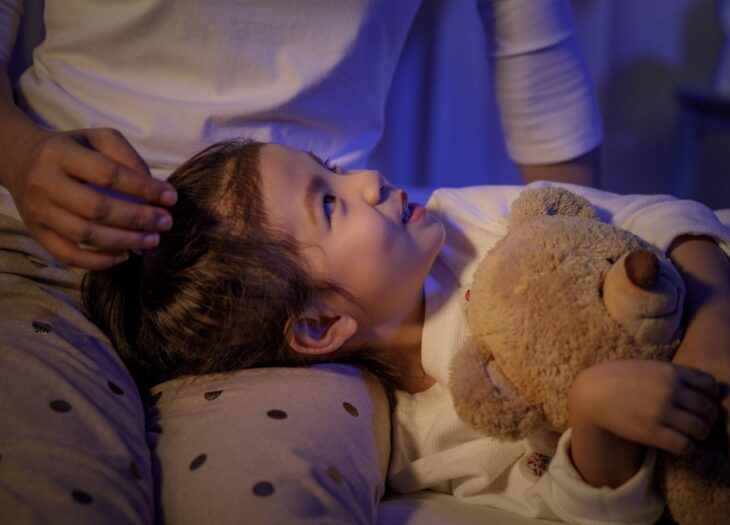Research shows that one in every four kids have or will develop sleep problems. There are many theories to explain the causes of sleep challenges in children and how to cope with such challenges.
To cope with children’s sleeping challenges, parents and guardians should understand the causes of sleep challenges and give the support children need to enjoy high-quality sleep. Kids weighted blanket is always a good option because of its calming and relaxing effects that help kids fall asleep faster and we will explore that more in the article below:
Contents
Why do kids have sleep problems?
There are three main reasons why a child may face sleep problems. They may either have a difficult time falling asleep, or they may have distracted sleep. They may also keep waking up at odd hours of the night.
Here are more explanations:

Source: Verywell Family
-
Biological reasons
Children with inherent medical conditions suffer sleep problems. An overactive thyroid function, breathing problems due to asthma, sleep apnea, and heart problems may also cause restlessness leading to insomnia in kids. Dispositions also differ, and those with high temperaments are more irritable and often face sleep challenges. That is purely due to genes, and as the children grow older, they may overcome such sleep challenges. Some medications may also aggravate sleep problems in kids. Research shows that medications with beta-blockers, stimulants, and decongestants can disrupt sleep.

Source: Psychiatry Advisor
-
Environmental factors
Light contributes a lot to calming the nerves, and using blackout drapes to block external light can make the bedroom more conducive to sleep. The neighborhood also determines the calmness of the bedroom, and if one lives in a quiet and serene residential area, then falling asleep becomes easy. But most sleep distractions come from exposure to electronic media before bedtime. Playing games or watching captivating kids’ programs before bed stimulates their minds and may keep them alert for a long time. It also hinders the production of sleep hormones. This further compounds sleep problems.

Source: Partners in Pediatrics
-
Psychological factors
Anxiety and stress affect children more than parents care to admit. Factors such as parents’ divorce and child abuse contribute to the psychological problems that affect sleep. Even social issues such as an ongoing pandemic, challenges at school and home, changes in routine, and the environment may also cause stress and anxiety. Child-parent interactions concerning set rules and daily routines and how parents emphasize them can cause stress to kids who do not adhere to such rules and procedures.
Tips to Help Children Sleep Better

Source: Health Magazine
-
Make behavioral changes
The parents should lead by example and adopt behaviors that enhance relaxation before bed. If parents spend long hours watching TV or on their phones and other smart gadgets, kids unconsciously pick up such behavior. Establishing a schedule and following through with it helps in conditioning that behavior in kids. It sets the body to sleep on time as per the schedule.
Daily exercises and diet also affect sleep patterns. A parent or guardian should set a good example by eating a healthy snack that helps to calm the body to sleep. Parents should encourage kids to stay in their bedrooms at night. It will have a positive effect on their sleep patterns. You may read a bedtime story or encourage them to listen to relaxing music or read a book. Such behavioral changes help to stimulate sleep hormones.
Supplements such as melatonin can help kids to sleep better at night. But it has side effects that may accept the quality of sleep. Some kids report headaches and body aches after taking these supplements. Others may wet their beds or become irritable the whole day. Sleep supplements should be the last resort in case all other sleep-inducing techniques fail.

Source: The Sun
-
Provide a conducive sleep environment
Invest in making the bedroom a conducive environment for your kid to sleep. Weighted blankets will help reduce the anxiety that your kid may be experiencing and enable them to enjoy better sleep.
There are many other benefits of using a weighted blanket. Kids suffering from attention deficiency hyperactivity disease find it hard to sleep. But a weighted blanket can help to calm and relax them to fall asleep. Remember to keep the bedroom quiet and dark to enhance its calmness and tranquility. It enhances relaxation that consequently stimulates the production of hormones that induce sleep.
Assuring your kids frequently before bedtime and showing concerns about their challenges may have a positive psychological effect. In case they air their sleep challenges, listen to them and offer support as well as reassurance. Kids also have fears, and that impacts their sleep. If you listen to their life fears and give practical solutions, it eases their mind, and they will find it easier to sleep.
Read more here if you are interested in kids’ weighted blankets and find out more about different types!

Source: Ethos Interactive
-
Adopt other interventions
A room decor and ambiance scheme can overstimulate the brain or cause relaxation.
Kids tend to find it easy to relax in a bright but calming environment. Colors such as faded lavenders, greens, and light blue in their bedroom will enhance relaxation. Painting their rooms pink, soft gray, and other earthy tones also provides a calming and relaxing effect that induces sleep.
Encourage the kids to try peaceful bedtime mind exercises. Also, ensure that the kids do not sleep with pets. Meditation and deep breathing exercises before bed can also help. It may require some training and patience since the attention span for a kid is very short.
Set limits. Kids may leave their beds many times at night for varied reasons. A rewarding system where they get rewards when they do not go off-limits will encourage them to stay in bed more.
Breaking some bad sleeping habits will be hectic, and parents usually give up along the way. To attain consistency in sleep patterns, let the kids learn the routines and reinforce them. With time it will yield positive results.
Sleep deprivation in children can lead to fatigue, affect the immune system, and cause erratic mood swings. It may also result in poor health and stunted growth. Sleep and how it affects your children should be a priority concern to you. Investigating the causes of insomnia and adopting effective measures to help kids enjoy better sleep at night and reap all the benefits of quality sleep at night is a vital skill every parent should learn.
